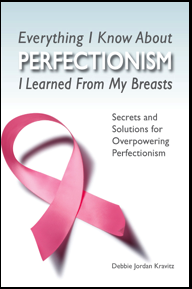Book Review: “Everything I Know about Perfectionism I Learned From My Breasts”
Then they tell you practice makes perfect.
I wish they’d make up their minds.
Perfect (adjective):
- free from any flaw or defect
- having all the required or desirable elements, qualities or characteristics; as good as it is possible can be
- blemish-free
The word “perfect” and the concept of that ideal sounds lovely, delightful and worthy. How then is it that perfectionism, or worse, the person who strives to achieve this quality, the perfectionist, is so often held in disregard, or worse, disdain?
What’s so bad about being a perfectionist that we use the term (at best, when we’re trying to be polite) to describe someone who seems picky, bossy, competitive, or dissatisfied?
How is it that that those who strive towards an ideal (sometimes to the exclusion of accepting anything short of that ideal) are often unhappy, so much so that it can divide them from their loved ones or even adversely impact their health?
How is it that having (impossibly) high standards can create implacable obstacles to building deeper personal relationships and exploring opportunities beyond the safe borders defined by our areas of expertise?
If perfect is good, how can trying so hard to be perfect be so bad?
The answers to these questions and more can be found in Everything I Know About Perfectionism I Learned From My Breasts: Secrets and Solutions for Overpowering Perfectionism by my friend and colleague  Debbie Jordan Kravitz, professional organizer and blogger.
Debbie Jordan Kravitz, professional organizer and blogger.

Long-time Paper Doll readers know it’s rare for me to review books in this venue. There are just so many books published about organizing issues, and I am usually trying to get you to keep your personal libraries as streamlined as possible. However, I’m fascinated by the depth and breadth of discussion and analysis Debbie has brought to bear on the subject of perfectionism, and am compelled to share my thoughts with you.
When Debbie first told me that her book was to be published this summer, I was struck by the power of the title. Sure, it’s initially humorous, but the iconic pink ribbon on the cover asserts that there’s a deeper meaning. As a breast cancer survivor, Debbie’s revelations about the necessity of overcoming her perfectionist tendencies (for her own sake as well as her family’s), informed her desire to write this book. But, to be honest, until I had a copy in my hands, I think I was expecting a memoir, even a breasts’ eye view, as it were, of how her cancer and recovery brought Debbie to some sort of epiphany about the challenges of fighting perfectionism.
In fact, while Debbie does share her own story, this book offers much more, both to those of us who struggle with the ideals of perfection and those of us who have friends, family and co-workers whose perfectionism drives their own behaviors. Everything I Know is informative (indeed, eye-opening) about perfectionism, but also offers practical guidance and motivation to those seeking to become recovering perfectionists.
After a personal and revealing introduction, the book really begins in earnest with an explanation of why perfectionists do what they do. It might seem obvious–after all, shouldn’t we all want to strive to be perfect, to be the best? But perfectionism is not merely striving for an ideal, but it can also be reflected in self-destructive, sometimes obsessive, tendencies.
In introducing readers to the individuals in her case studies, Debbie discusses some of the myriad underlying causes of perfectionism, ranging from what she calls inherited perfectionism (whether that inheritance is almost genetic in nature or bequeathed, a result of family/social conditioning) or practically the reverse, as an overcompensating, adaptive (and later maladaptive) response to one’s upbringing or early environment. Debbie also examines how low self-esteem, an inclination towards people-pleasing, attention deficit disorder and a variety of other internal and external factors can collude within one’s psyche to develop perfectionist tendencies.
These case studies–real people with real stories–present a vivid (but never exploitative) picture of the negative, and even hidden, consequences of perfectionism. Even if you don’t see yourself and your own inclinations in any of these case studies, I challenge you not to see characteristics that remind you of people you know or love, or people you’ve worked with (or for) and recall how interacting with perfectionists impacted your relationships with them.
I found the section of Everything I Know on the adverse consequences of perfectionism to be revelatory. As a professional organizer, I most often see client perfectionism operate in one of two ways, in terms of procrastination or over-complication, and hadn’t considered much beyond those two areas.
First, members of our profession are often called to work with “perfectionist procrastinators”, as Dr. Linda Sapadin describes them in her classic It’s About Time: The 6 Styles of Procrastination and How to Overcome Them. Perfectionist procrastinators, as Dr. Sapadin notes, can be so idealistic about what the end-result must be that they can be very unrealistic in terms of their appraisal of how much energy and/or time is needed to achieve a (possibly unattainable) result. Further, perfectionist procrastinators tend to have an elevated fear of failure, which leads them to delay even beginning the tasks that can bring a project to successful completion. We professional organizers often come in to help clients re-frame or redefine a better end-result (satisfaction, efficiency, ease of use, functionality, etc.) rather than aesthetic or other perfection.
Second, we’re also called by clients who have previously attempted to create their own over-complicated systems to achieve the “perfect” filing system or work flow or closet arrangement. They then discover that neither they nor their co-workers or family members have any willingness to actually stick with the extra, sometimes exhausting, steps of the so-called perfect system.
Beyond my own professional experiences with perfectionism, I hadn’t really delved into all of the other ways, outside of the realm of organizing, that perfectionism feeds into more complex and challenging difficulties. Debbie’s analysis of the more serious elements of perfectionism spans a spectrum including eating disorders, mental paralysis, social anxiety disorders, clinical depression and chronic disorganization. The book offers checklists of identifying warning signs for the more dangerous situations, and a list of resources and references to guide readers towards supportive and/or professional help.
As I mentioned, Everything I Know is incredibly informative, delving into identifying and understanding various aspects of perfectionism, but its true strengths lie in offering practical guidance and motivation to help readers achieve their own “A-Ha!” moments. In every case study, each recovering perfectionist shares his or her own tale of transformation along with what he or she found as the most effective tips for overpowering perfectionism.
The case study success stories and tips are followed by a chapter entitled “Solutions for Living a Less-Than-Perfect Life”, chock-full of psychological “reality checks” and practical task-oriented checklists for those seeking to gain the upper hand on their perfectionist tendencies.
Incidentally, I think the subtitle to Everything I Know About Perfectionism I Learned From My Breasts is particularly apt: Secrets and Solutions for Overpowering Perfectionism. To Paper Doll, the choice of the word “overpowering” is very telling; the implication is that it’s a fight, a struggle, and one that is active and ongoing. Other alternatives (e.g., controlling, overcoming, conquering) might imply a “perfect” solution, something that is solved and need never be considered again. As a self-described recovering perfectionist, Debbie knows that challenging one’s own notions about perfectionism (bad) vs. excellence (good) is a never-ending process. If it wouldn’t be too ironic, I’d say her choice of wording was just about perfect.
The text of Everything I Know About Perfectionism I Learned From My Breasts is interspersed with uplifting and motivational quotes. I think the most appropriate one for this review is:
unless you happen to be going down.
~Arnold Glasgow, American humorist
If you or someone you know struggles with perfectionism, Debbie Jordan Kravitz’s book is a true friend.
By the way, when you order Everything I Know About Perfectionism I Learned From My Breasts, enter Komen in the donation code, and $2 of your purchase will go towards The Susan G. Komen for the Cure Foundation.




Follow Me